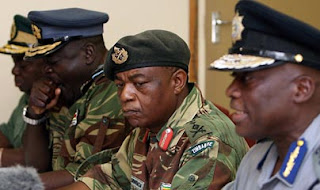MUGABE`S KILLING MACHINE; NAMES & FACES
 The tight circles of "securocrats", who sit on the Joint Operations Command (JOC) committee, are now believed to be in day-to-day charge of Zimbabwe's government. They ensured Mr Mugabe did not step down after his defeat in the presidential election's first round in March 2008 and are now masterminding a campaign of terror to suppress the opposition Movement for Democratic Change and guarantee victory for Mr Mugabe in the upcoming elections this year.
The tight circles of "securocrats", who sit on the Joint Operations Command (JOC) committee, are now believed to be in day-to-day charge of Zimbabwe's government. They ensured Mr Mugabe did not step down after his defeat in the presidential election's first round in March 2008 and are now masterminding a campaign of terror to suppress the opposition Movement for Democratic Change and guarantee victory for Mr Mugabe in the upcoming elections this year. The government indefinitely suspended all work by aid groups and non-governmental organizations, accusing them of breaching their terms of registration. Mr Mugabe is a useful figurehead who still commands the deference of other African leaders, notably Former President Thabo Mbeki of South Africa. But the western diplomat said Mr Mugabe's power had ebbed away and Zimbabwe was now run by a "junta". "This is a military coup by stealth," he said. "There are no tanks on people's lawns, but the Joint Operations Command runs this country." The most powerful figures on the JOC are Gen Constantine Chiwenga, the overall military chief; Augustine Chihuri, the national police commissioner, and Gen Paradzai Zimondi, the commander of the prison service.
Air Marshal Perence Shiri, the commander of the air force, who masterminded a brutal military campaign against Zimbabwe's minority Ndebele people in the 1980s, is also part of the circle, although believed to be less influential.All four fought in Mr Mugabe's guerrilla army during the war against white rule in the 1970s. Each has publicly proclaimed their support for the ruling Zanu-PF party. They have also benefited from Mr Mugabe's seizure of white-owned land, with farms and business concessions falling into their hands, allowing them to amass considerable wealth.
The diplomat said after the first round of the election on March 29, 2008, Mr Mugabe, 84, "almost went" when it became clear that Morgan Tsvangirai, the opposition leader, had won significantly more votes. But a pivotal meeting of the JOC on March 30 convinced him to stay. "The generals didn't let him go," said the diplomat. From that moment, Mr Mugabe was "beholden to his senior generals to hold office". Another source inside Zimbabwe confirmed: "He [Mugabe] was prepared to concede but the generals, whose positions would become uncertain with his departure, prevented that from happening," he said. Other observers backed the diplomat's view that Zimbabwean politics had fundamentally changed.
Tiseke Kasambala, a Zimbabwe specialist at Human Rights Watch, said there was an "increasing militarisation of the state". "The evidence points to an increasing role by the army in state affairs," she said. "The army is no longer just in barracks, waiting to protect the country. The army is out there, taking a role in the day-to-day government of the country."
Mr Mugabe does not fear his generals will actually overthrow him they still need him as the regime's titular leader – or he would not have travelled to Rome. However, observers believe Mr Mugabe's age and his new dependence on the generals means he is no longer the sole arbiter of Zimbabwe's fate.
Stanley Mauro Jensen

Comments